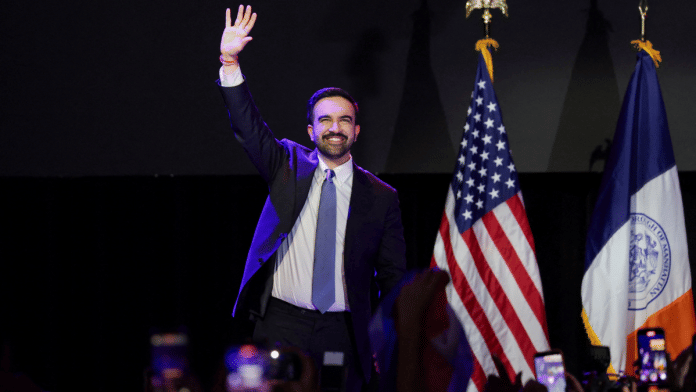New Delhi: Zohran K. Mamdani has been elected as mayor of New York City in an election that saw more than two million voters cast their ballots for the first time since 1969. Mamdani’s victory is a remarkable political outcome for a candidate, who a year ago was unexpected to win the city’s top job.
As a 34-year-old state assembly member, Mamdani built a campaign focused on the affordability crisis, with a strong use of social media and extensive canvass, all of which turned the race around. The candidate defeated his nearest challenger, the former Democratic Governor of New York, Andrew Cuomo, by a close 10 percentage points, to become the first Muslim mayor of New York.
The insurgent campaign by a backbench state-lawmaker was launched at a time when the Democratic old-guard in New York City remained scandal-riddled, disillusioning the city electorate. In September 2024, incumbent Mayor Eric Adams was indicted on federal charges of bribery and fraud.
In a slick campaign video in October 2024, Mamdani had laid out his three core promises—freeze the rents for the roughly one million rent-stabilised homes and build new affordable housing, make buses free and faster, and provide universal childcare for all.
The message worked, with New Yorkers selecting Mamdani over Cuomo for the second time in five months—first in the primary polls, securing the Democratic nomination and now, in the general election. Cuomo, the former Governor of New York, was once the most powerful leader in the state. The son of Mario Cuomo, who was also a powerful governor in Albany, Cuomo was expected to win by a mile in the elections as a part of his return to the political stage.
However, Mamdani defeated him in a closely contested primary election in June. In the general election, over a million voters cast their ballots in support of Mamdani, while Cuomo was a distant-second at around 850,000 votes cast in his favour, according to data from the Board of Elections in the City of New York.
Curtis Sliwa, the Republican nominee, won around 145,000 votes and finished a distant third, conceding the election very early in the night. Mamdani’s win comes at a time when the Democratic Party is still reeling from the loss of the White House and the US Congress in November 2024.
Mamdani was born in Uganda to parents with Indian descent and is also, according to The New York Times, the first mayor since Abe Beame in the 1970s to be born outside the borders of the US.
Also Read: Mamdani signals a shift in American politics. And how immigrants see themselves in it
Mamdani now faces Albany, distrust, and Trump’s shadow
He is also to become the first mayor of South Asian descent. However, despite the strong support, Mamdani is set to face a number of challenges as he takes over at City Hall. A large part of his policies, including any tax increases, needs to be passed by the State Legislature in Albany and signed into law by Governor Kathy Hochul. While the Governor has hit the campaign trail in support of Mamdani, there remains questions over the support the State Legislature would give for his funding plans.
The Mayor-Elect is also poised to enter city hall with deep distrust of a number of core demographics in New York City.
Home to almost 1.4 million Jews, New York City has one of the largest Jewish populations outside of Israel. Politics within the community continues to be deeply fractured since the 7 October 2023 attacks by Hamas and the resulting war in Gaza. A large number of Jewish organisations, including the UJA-Federation of New York, came out against Mamdani during the election campaign.
Furthermore, above the local and state politics looms US President Donald J. Trump. The American President who built his business empire and identity in the city played a role in the election. The Democratic Party has struggled to find a message to oppose Trump, and the off-year elections provides an opportunity for the party members to jostle to lead the track the Party takes into the 2026-midterm elections.
Trump, who weighed into the race over the weekend, threw his support behind Cuomo in a back-handed manner, claiming that he would rather have a “bad Democrat” than a “communist” in City Hall.
(Edited by Shashank Kishan)






